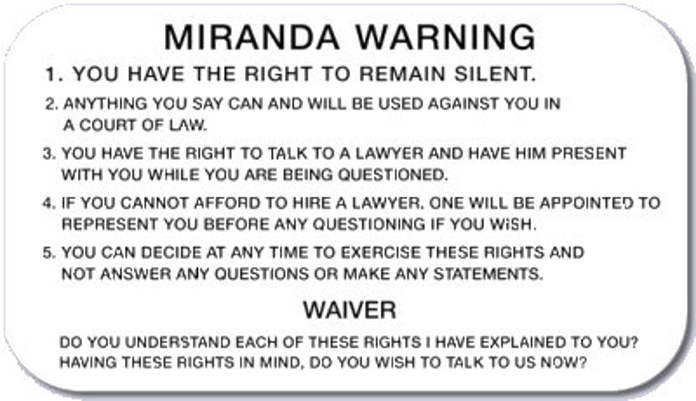1. Search, Seizure and the Constitution
The Fourth Amendment of the United States Constitution provides individuals a right against unreasonable search and seizure from the state. Generally speaking, a search must be conducted with a valid warrant, supported by probable cause. A warrantless search is only valid where there exists an exception to the warrant requirement. If a state actor (such as the police) violate one’s Fourth Amendment right against unreasonable search and seizure, the remedy is the suppression of the evidence improperly seized, as well as what is referred to as the “fruits of the poisonous tree.” If evidence is obtained from a constitutionally unreasonable search (the poisonous tree), and that evidence is used to justify further searching, then any additional evidence uncovered solely because of the subsequent search (tainted fruit) must also be suppressed.
2. "Search" Definition
We first must define a search. A search is a state actor’s intrusion into an area in which a person has a legitimate expectation of privacy. To start, the right is only against the state. If UPS looks in your 10 lb. package and discovers marijuana, that was not a violation of your Fourth Amendment Rights because UPS is not part of the state. Second, there has to be a legitimate privacy interest. A person has a legitimate privacy interest in his or her own home. As a consequence, the search of one’s home requires a warrant supported by probable cause, specifically stating the reason for the search, the items sought after, and the premises that will be searched. A person also has a legitimate privacy interest in their person and in their vehicle, although that right is subject to some limitations, depending on the location, among other circumstances.
Importantly, a person does NOT have a legitimate privacy interest for activity conducted or items kept in someone else’s home. Therefore, if you engage in illegal activity in someone else’s home, you cannot reasonably expect that your conduct will be private. If the home is searched without a warrant, you do not have “standing” to contest the search on the basis of its being warrantless because you do not have a legitimate privacy interest in someone else’s home. You also do not have a privacy interest in abandoned property. For example, the search of trash that you put on the curb does not require a warrant because once the trash is abandoned, you give up control over who might rummage through it, including the police.
3. Plain View and Plain Smell is not Private
A search requires an intrusion into an area with a legitimate privacy interest. If criminal activity or contraband is observed in plain view, one cannot claim that it is private—this is called the “plain view” doctrine. If an officer responds to a house for a domestic violence call, is in a public place, and sees a 4 foot tall marijuana plant growing out of an enclosure in the back yard, the officer is permitted to investigate further without a warrant.

Similarly, if the odor of a known illegal substance is smelled in a public area, the officer does not need probable cause to investigate. For example, if an officer responds to a home and smells burning or raw marijuana emanating from inside, he is permitted to enter the home and search. This doctrine is used for drug interdictions in traffic stops. A trained dog has the ability to detect substantially smaller quantities of odor than a human. During a traffic stop, a drug dog can be used to conduct an open air sniff, walking around the vehicle, so long as the duration of the stop is not extended beyond the scope of the initial stop. If the dog detects the odor of an illicit substance and indicates its presence to the officer, this is not considered a search. The dog’s indication can be used to establish probable cause to conduct a warrantless search of the passenger compartment of a vehicle.
Exceptions to the Warrant Requirement
4. Pat-Downs
There are a number of exceptions to the general requirement that an officer have a warrant to conduct a search. A “Terry Stop” or pat-down of a suspect is an exception to the warrant requirement. Where there is a reasonable, articulable suspicion that the suspect could be armed, the officer can perform a pat-down. Then, if, during the patdown, the officer feels a weapon OR an item that is readily identifiable as contraband, the officer may investigate. A common example goes as follows: While conducting a traffic stop, an officer is permitted to order the suspect out of a vehicle and seat the suspect in his patrol cruiser to facilitate the stop in a safe location. In doing so, if the officer can articulate a suspicion why the suspect may be armed, the officer may perform a patdown of the suspect. If he feels what he knows in his education, training, and experience to be a crack rock in the suspect’s pants pocket, he is permitted to retrieve it. However, if he feels a cigarette pack in the suspect’s pants pocket, he is not permitted to retrieve it and look through it to see if there is a crack rock inside because a cigarette pack is not readily identified as contraband. It is NOT a justification to look through a cigarette pack simply “because drug users usually keep their drugs in cigarette packs.”
5. Exigent Circumstances
“Exigent circumstances” are another exception to the warrant requirement. If a person is in risk of physical harm, an officer is permitted to enter a residence to render care. In doing so, the officer may also conduct a “protective sweep” of the residence, only looking in areas large enough to conceal a person, to confirm that there are no threats to officer’s presence inside the residence. If, in a domestic violence call, police hear an individual calling for help, police can enter without a warrant. Additionally, they can do a protective sweep throughout the residence to look for perpetrators who may pose a risk to law enforcement. They cannot, however, look through dresser drawers for guns and drugs. Exigent circumstances only relate to emergencies where fast action is necessary to prevent harm to life and limb. Exigent circumstances would NOT justify police to rush into a residence because they hear a toilet flushing inside and evidence could be being destroyed.

6. Special Governmental Needs
“Special governmental needs” are another common exception to the warrant requirement. Probationers do not have the same legitimate interests in privacy that non-probationers have. A condition of probation is often the consent to the search of the probationer’s residence. They have been convicted of a crime and are subject to supervision. Similarly, a person does not have a legitimate interest of privacy in the groin area of their pants when they enter an airport. There are heightened or special governmental interests that supercede the individual’s otherwise reasonable expectation of privacy.
7. Automobile Searches
Automobiles are an enormous exception to the warrant requirement. Because automobiles are readily mobile, the United States Supreme Court has found that it is impractical to obtain a warrant prior to searching a vehicle. Instead, there is a lower privacy interest in an automobile. If an officer can reasonably articulate a suspicion that criminal activity is afoot, the officer is permitted to search the passenger compartment of a vehicle. Police commonly claim that the vehicle was in a high crime area, or observed leaving a know drug house. General offense reports also regularly state that the officer observed fast or secretive movement (“furtive movement”) within the passenger compartment of a vehicle upon pulling it over. The officer might further indicate that upon contact, the driver seemed “excessively nervous” or there were multiple “odor masking devices” (air fresheners) hanging from the rear view mirror. Perhaps after questioning the driver, the officer determines that the driver’s story doesn’t make sense. The more indicators that the officer notes, the better he has articulated that criminal activity is afoot, and the more justified he will be in deciding to search the passenger compartment of the vehicle.

Note: If an automobile is towed, an inventory search may be performed to protect law enforcement and the owner against claims of theft. Inventory searches are often used to circumvent the “fruit of the poisonous tree” doctrine (remember paragraph 1?). Perhaps an officer unlawfully searches a passenger compartment of a vehicle and finds a kilogram of cocaine. Problem is, the driver has a warrant for his arrest and the vehicle could have been towed. The unlawfully recovered evidence would have been located during the inventory search, anyway. Because of its inevitable discovery, the evidence is still admissible. This is called the “inevitable discovery” doctrine.
8. Consent
Sometimes there may not be a strong basis to search, so the officer will fish for it. He will ask, “You don’t have any knives, guns, drugs, anything like that in your car, do you?” That question is often followed by, “You don’t mind if I look in your vehicle, do you?” Amazingly, many people who have knives, guns, or drugs in the car will think they are calling the officer’s bluff and say, “No, go right ahead and search my car.” The officer searches the car and finds knives, drugs and guns.
Consent is an exception to the warrant requirement. If the person with the privacy interest consents to the search, they no longer have a privacy interest because they have waived their interest in privacy by consenting. You are not required to waive your interest in privacy. You do not have to consent to the search of your vehicle. Even if you have nothing to hide, do not consent to a search. It is a major inconvenience and an unnecessary waste of your time. If you give an officer consent to search, he will search. You will sit in his patrol cruiser and wait. If you refuse consent, the officer may say that he will go ahead and get a warrant. That is a much better bluff to call. If he feels confident that he has probable cause to search, let him seek a warrant and you can dispute it in court later. That's the way it's supposed to work.
9. Arrest Warrants
An arrest warrant is a final, minor exception to the warrant requirement. If a suspect is known to be in or reside in a residence, and law enforcement has an arrest warrant for the individual, they are permitted to enter into the residence to execute the arrest warrant. Similar to exigent circumstances, law enforcement can perform a protective sweep of the residence to execute an arrest warrant, even after already apprehending the suspect for whom they have the warrant.
10. Final Thoughts
- You should always assume that a warrant is required for a search.
- You do not have to consent to a search, so don’t. Even if you have nothing to hide, they are inconvenient.
- If an officer performs a search without a warrant, politely comply.
- *Tip: Patrol cruisers are often of capable of recording audio in the cabin, so while you sit in the cruiser and watch, stay silent. You don't want the jury to hear your running commentary saying "oh crap" as the police hit paydirt in your trunk.
If you are charged with a crime based upon the search of your person or property, a lawyer will help you determine whether the search was constitutionally valid. If it was invalid, the attorney will file a motion to suppress the evidence. The area of Fourth Amendment search and seizure is a robust and complicated area of law. Be safe, be courteous, never consent, and get an attorney if you are ever charged with a crime.

 Should I Pay the Waiver?
Should I Pay the Waiver? Felony THC Possession
Felony THC Possession Forming an LLC
Forming an LLC Anatomy of a DUI Case
Anatomy of a DUI Case A Criminal Case: From Arraignment to Trial
A Criminal Case: From Arraignment to Trial Winning a Social Security Disability Case
Winning a Social Security Disability Case 6 Questions About Chapter 7 Bankruptcy
6 Questions About Chapter 7 Bankruptcy 8 Reasons to Have a Will
8 Reasons to Have a Will 9 Divorce and Custody Questions
9 Divorce and Custody Questions Issues Considered in a Domestic Relations Action
Issues Considered in a Domestic Relations Action You Have the Right to Remain Silent: Exercise It!
You Have the Right to Remain Silent: Exercise It! A Guide to DUI
A Guide to DUI Ohio Law Bans Red Light Cameras, Cities Sue
Ohio Law Bans Red Light Cameras, Cities Sue Sex Offender Fails to Disclose E-Mail: Prison
Sex Offender Fails to Disclose E-Mail: Prison Plea Deal Rules that Limit Advocates' Judgment
Plea Deal Rules that Limit Advocates' Judgment Private Universities’ Police Records are Public
Private Universities’ Police Records are Public NFL Players Prevail over Cleveland's Tax Practices
NFL Players Prevail over Cleveland's Tax Practices